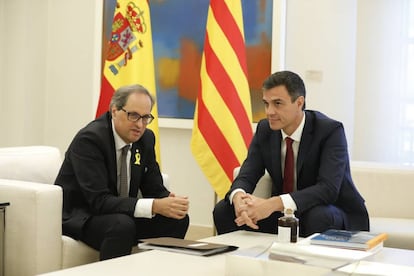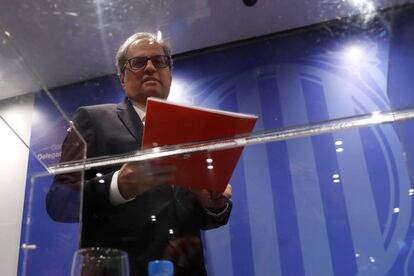Catalan premier meets Spanish PM, insists on right to self-determination
First official meeting between Socialist Party’s Pedro Sánchez and hardline separatist Quim Torra lasted two-and-a-half hours, and saw the pair “give their visions of Catalonia”

Spanish Prime Minister Pedro Sánchez and Catalan regional premier Quim Torra met for two and a half hours on Monday inside La Moncloa, the Spanish seat of government, in their first official effort to normalize relations between Madrid and Barcelona.
“A political crisis requires a political solution. This meeting is a constructive starting point to normalize relations,” tweeted Sánchez afterwards. It was the first such meeting in two years, following a breakdown of relations in the wake of the secessionist bid, the central government’s response to the October 1 referendum, and the breakaway laws passed by the Catalan parliament.
Una crisis política requiere de una solución política. Esta reunión es un punto de arranque constructivo para la normalización de las relaciones. pic.twitter.com/VquAwJZCSV
— Pedro Sánchez (@sanchezcastejon) July 9, 2018
At a press conference of his own at 4pm, Torra said that “the meeting has been long, honest and work-based, and we have given our visions for Catalonia. There’s been a mutual acknowledgement of what we each represent. Sánchez has admitted that this is a political problem that requires political solutions. And we’ve talked about everything.”
Sánchez, of the Spanish Socialist Party (PSOE), issued his invitation to Torra shortly after becoming the new prime minister of Spain a month ago in a successful and historic no-confidence motion against Mariano Rajoy, of the conservative Popular Party (PP). Torra, a separatist politician who has publicly vowed to keep working toward an independent republic, has reportedly invited Sánchez to a work meeting in Barcelona at an unspecified date.

The get-together seeks to send out a message of hope and change following a protracted breakdown in relations between the central and regional governments, although it did not resolve fundamental disagreements over the nature of Catalonia’s relationship with Spain. Sánchez’s party defends Spanish unity and does not support a referendum on self-determination, although it is open to granting further powers of self-rule and addressing old grievances. Torra, for his part, has repeatedly defended a Scottish-like referendum for the region.
On Monday Torra, who was handpicked for the post by Carles Puigdemont – the ousted Catalan premier who fled Spain to avoid being tried for rebellion – said: “I have expressed that any political solution must first go through the right to self-determination for Catalonia. Regarding the prisoners, I told him that there are Catalan political prisoners and exiles.”
He was alluding to separatist politicians such as Puigdemont who have fled Spain to avoid arrest, as well as those being held in pre-trial custody since late last year over their roles in the unilateral declaration of independence. The central government denies that these are “political prisoners.”
Opposition
Several opposition parties have been critical of the meeting, particularly the PP, which was removed from power in the no-confidence motion led by Pedro Sánchez with support from Catalan separatist deputies among others.
"We never met to talk about self-determination with any [regional premier], and we didn't owe anything to the independence movement, while Sánchez owes them everything," said PP spokesman Rafael Hernando, alluding to Catalan separatists' support for Sánchez's no-confidence vote.
At an earlier press conference, Spain’s deputy prime minister, Carmen Calvo, underscored the importance of the meeting. “We are talking about normality and this is normality. We talked and we listened, and we are aware of the political project represented by Mr Torra. But the government of Spain will not give up because it cannot give up on the defense of our constitutional order.”
“Torra spoke about self-determination and Sánchez responded with a very high degree of self-government, and a very high decentralization of power,” she continued. “We have the obligation to defend our constitutional order; we know there is an independence project in Catalonia, but Catalonia can improve on many attainable goals.”
Calvo said that “Torra makes statements on a right to self-determination that does not exist as a right in any European constitution. We need to talk about Catalonia’s autonomy and about matters that are stuck in the Constitutional Court. We are ready to lift the veto on a few laws on energy, healthcare and poverty that are part of the policies of the new government of Spain.”
English version by Susana Urra.
Tu suscripción se está usando en otro dispositivo
¿Quieres añadir otro usuario a tu suscripción?
Si continúas leyendo en este dispositivo, no se podrá leer en el otro.
FlechaTu suscripción se está usando en otro dispositivo y solo puedes acceder a EL PAÍS desde un dispositivo a la vez.
Si quieres compartir tu cuenta, cambia tu suscripción a la modalidad Premium, así podrás añadir otro usuario. Cada uno accederá con su propia cuenta de email, lo que os permitirá personalizar vuestra experiencia en EL PAÍS.
¿Tienes una suscripción de empresa? Accede aquí para contratar más cuentas.
En el caso de no saber quién está usando tu cuenta, te recomendamos cambiar tu contraseña aquí.
Si decides continuar compartiendo tu cuenta, este mensaje se mostrará en tu dispositivo y en el de la otra persona que está usando tu cuenta de forma indefinida, afectando a tu experiencia de lectura. Puedes consultar aquí los términos y condiciones de la suscripción digital.








































